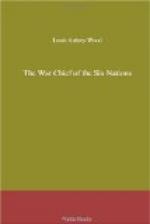While Joseph was doing his utmost to keep the Indians loyal and was keeping watch upon those who were plotting to win them from their allegiance to the crown, Sir John Johnson was growing anxious for his own life. So great was his, fear of being killed or abducted that he increased his body-guard to five hundred men. At the same time, he placed swivel-guns about his house, in order to withstand a sudden attack. He energetically organized the settlers on his domains into a protecting force. In particular the Highland loyalists in his district rallied to his aid, and soon a hundred and fifty brawny clansmen were ready to take the field at the shortest notice.
But the Six Nations were by no means united in their loyalty to the crown. Brant saw that the tribe most wavering in its support was the Oneidas. He found that their missionary, Samuel Kirkland, was in league with the rebels, and sought to have this clergyman removed. Failing in this, he wrote to the Oneida chiefs, urging them to remain loyal to the king. A letter that an Oneida runner let fall at this time on an Indian path is the earliest bit of handwriting that we have from Joseph Brant’s pen. In it he warns the Oneidas against the subtle work which the colonists were carrying on. ’Guy Johnson is in great fear of being taken prisoner by the Bostonians,’ he says. ’We Mohawks are obliged to watch him constantly. Guy Johnson assures himself, and depends upon your coming to his assistance... He believes not that you will assent to let him suffer.’ The appeal thus made seems, however, to have met with little response from the Oneidas, and Brant was rebuffed. Even before this they had sent a letter to the governor of Connecticut expressing in, plain terms their desire to remain neutral when hostilities should commence. ’We cannot intermeddle in this dispute between two brothers,’ was their decision. ’The quarrel seems to be unnatural.’ The Oneidas had the right to their opinion, but their conduct must have stung the heart of the chief of the Mohawks. Yet never for a moment did his courage fail. He knew that the bulk of the Six Nations were willing to give their life’s blood in the service of the king. He and they would be true to the old and binding covenant which their forefathers had made as allies of the crown. ’It will not do for us to break it,’ said Brant, ‘let what will become of us.’
Civil war was now impending in the colonies. The battle of Lexington had been fought, and the whole country was taking breath before the plunge into the conflict. Guy Johnson and Brant were waiting to declare themselves and the time was nearly ripe. The first move was made just after the Mohawk chiefs had been summoned to a council at Guy Park, [Footnote: ’A beautiful situation immediately on the bank of the Mohawk. The elegant stone mansion is yet [1865] upon the premises giving the best evidence of substantial building.’—William L. Stone, Life of Joseph Brant, vol. i. p. 71.]




